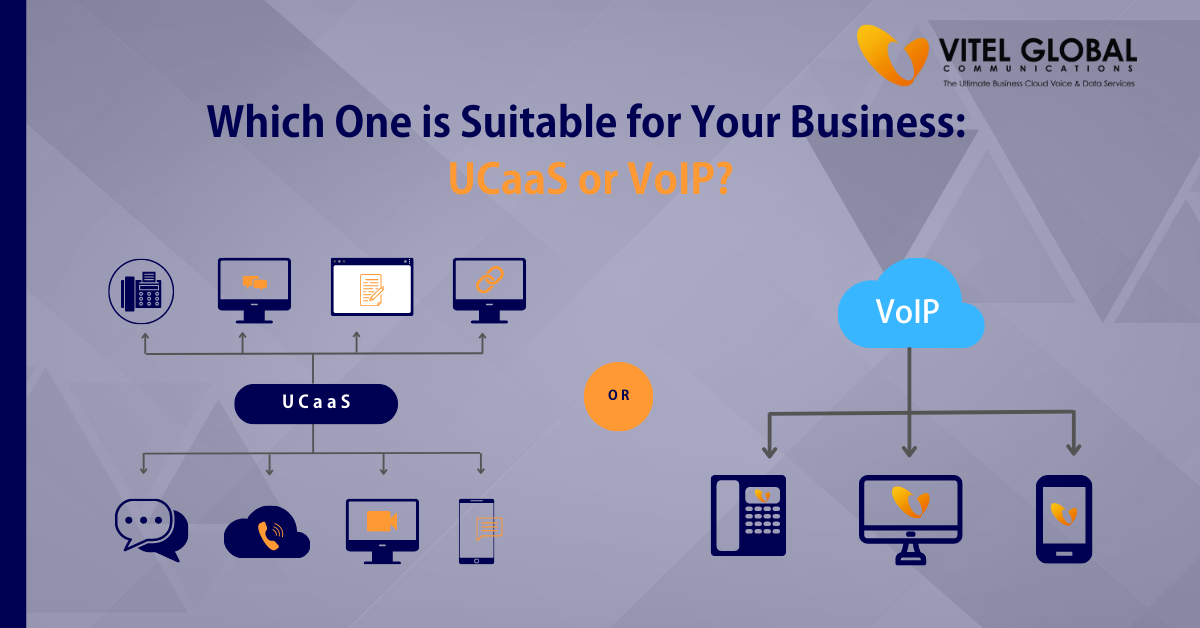UCaaS Service Providers: Features & Top Tech Trends

4 min read
This blog post identifies what UCaaS service providers provide for their clients like scalability, security, automation, and compatibility with other technologies. It also includes the top tech trends that these providers have embraced or are already using.
UCaaS is a set of computer-based communications tools, services, and applications that users can access through a web browser or mobile device.
Business Phone service trends are often overlooked in the cloud technology market. However, these services provide a blend of on-premise, public clouds as well as enterprise software and hardware to align with industry standards.
Let us cover the details and features of Unified Communication as a Service (UCaaS) providers.
Virtualized, Cloud-Based Infrastructure
UCaaS service providers offer a cloud-based infrastructure that is highly scalable and offers users an easier way to manage. UCaaS features offer UC applications and services that are available as Software as a Service or Platform as a Service. The software can be quickly provisioned and deployed in the cloud at any time. These types of deployments are important for companies who want to use the application. And don’t want to maintain all the servers themselves.
Key Features
- Voice Communication: We offer a range of voice communication solutions from standardized softphones, and conferencing services to mobile and web-based applications.
- Mobility: We offer a wide range of mobile and web-based UCaaS applications. It offers several options for routing communications from any endpoint to the mobile or web interface. Some service providers offer additional software and hardware that can be installed in the customer’s office PCs or on their devices, which greatly enhances the capabilities of communications solutions.
- Remote Access: A common feature among service providers is remote access. Remote access solutions provide secure and reliable VPN and other connectivity options to remote employees.
- Virtualized Infrastructure: Virtualization of servers is a key feature in UCaaS service offerings, especially for the enterprise market. Virtualization allows users to create client-side environments that are highly customizable so clients can create all the customizations they need without having to maintain their hardware. Virtualization also allows companies to use just as much infrastructure as they need, which greatly reduces costs when compared with traditional on-premise UC solutions.
- Scalability: A major benefit of service providers is scalability. The virtual servers can easily scale up or down to meet the growing needs of customers. The minimum infrastructure required for UC solutions and the ability to scale when needed allows companies to save on expensive capital expenses.
Communication Features
Business Phone service trends offer a wide variety of communication features that are available in all UC solutions such as presence, instant messaging, voice, video, and conferencing capabilities.
Logging and Reporting
All UCaaS service providers offer logging and reporting features that allow users to keep an eye on the activity of UCaaS communications. Logging and reporting are also often useful for regulatory compliance purposes. Logging is crucial for systems integrators when troubleshooting issues in their customer’s systems.
Contact Center Features
Most Business phone service providers offer contact center solutions to allow users to improve their telemarketing and customer service. Features of these solutions include unified messaging, call handling automation, reporting, real-time activity monitoring, and predictive dialer functionality.
Performance
UCaaS service providers constantly upgrade network bandwidth, which means users can enjoy a better quality of experience when using the application. The UCaaS services are also optimized for cloud-based deployments which results in a better user experience. High availability is one of the key traits of UCaaS offerings since telecommunications is crucial for business operations.
Video Conferencing
UCaaS platforms increasingly include video conferencing, which is a valuable collaboration tool for teams working remotely. Video conferencing often integrates with voice and SMS/MMS messaging to provide an integrated collaboration platform.
Cloud Voice
Cloud voice solutions (often referred to as hosted VoIP) allow users to seamlessly integrate telephone services with their IT infrastructure.
This offerings are typically best for organizations that cannot accommodate on-premise phone systems due to lack of space or other infrastructure requirements.
Unified Messaging
Unified Messaging allows users to seamlessly manage email, voicemail, faxes, and SMS/MMS messages in a single inbox.
Top Technology Trends
AI Integration
It enhances features like chatbots for customer support, speech recognition for transcriptions, and predictive analytics for call routing.
Augmented Reality (AR) and Virtual Reality (VR)
These technologies are incorporated into UCaaS systems to provide a more immersive customer experience.
Cloud-Based, Mobile-Optimized, Connectivity (MOC)
Business Phone service trends will take advantage of mobile and cloud features to offer easy access from anywhere at any time.
Handset Integration
This is a commonly useful feature that provides phones with the ability to download and record UC applications. Installing of apps can done through a smartphone application management system (SAMS) as opposed to directly on the phone itself.
Thus, users won’t have to install anything on their own devices but only download the application management system – which could be stored on a cloud service provider’s website or mobile app store.
Benefits
With the help of a unified communications service, businesses can enjoy myriad benefits such as cost-effectiveness, increased productivity, improved collaboration and communication, and greater customer satisfaction. Other benefits include clear communication, real-time calling, and video conferencing features, easy access to contacts for users on the go, cloud storage integration with voice mail systems, call recording capability, and auto attendant capabilities with mailboxes available at all times for employees to leave messages in.
The application management system is the business communication API software that allows business users to download various UC applications for their different needs.
This includes the ability to control who can leave voicemail messages and which employee can answer on the phone. It also provides a way for callers to use any phone regardless of manufacturer or OS. This allows businesses to have different ways of calling in and communicating with customers.
Conclusion
The service providers offer UC solutions for all types of users from enterprises and SMBs to mobile communication devices. These solutions will be hosted in private cloud and public cloud environments which allow the organization to deploy them at any time. They require no specialized hardware or software installations. The UCaaS solutions offered by the service providers are available anywhere at employers’ request since they leverage their existing telecommunications infrastructure.
This way companies can save on their high IT expenses without decreasing their business operations capabilities. Enterprise business phone systems offer a comprehensive suite of communication and collaboration tools with features.
Maximize Your UCaaS Potential
Explore the latest features and top tech trends in UCaaS service providers and discover how to revolutionize your business communications.
Published: December 26th, 2023
Subscribe to Our Latest Updates
Get monthly product and feature updates, the latest industry news, and more!








